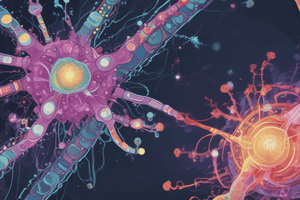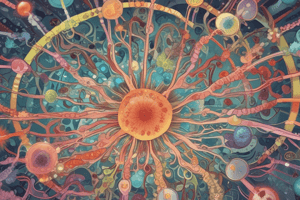Podcast
Questions and Answers
Which type of immunity is sometimes called humoral immunity and is a function of the B-lymphocytes?
Which type of immunity is sometimes called humoral immunity and is a function of the B-lymphocytes?
- Cell-mediated immunity
- Innate immunity
- Passive immunity
- Antibody-mediated immunity (correct)
Where does the immunological competence of B-lymphocytes typically develop?
Where does the immunological competence of B-lymphocytes typically develop?
- Thymus
- Lymph nodes
- Spleen
- Red bone marrow (correct)
Which of the following mechanisms of antibody action involves the direct action of antibodies?
Which of the following mechanisms of antibody action involves the direct action of antibodies?
- Via activation of the complement system
- Passive immunity
- Via activation of the anaphylactic system
- Direct action (correct)
What are the main lymphoid tissues where B-lymphocytes tend to be found after leaving the red bone marrow?
What are the main lymphoid tissues where B-lymphocytes tend to be found after leaving the red bone marrow?
Which condition involves the steps of an allergic reaction, specifically in the context of Allergic Rhinitis?
Which condition involves the steps of an allergic reaction, specifically in the context of Allergic Rhinitis?
Which of the following is responsible for presenting an antigen-MHC complex to a sensitized helper T-cell?
Which of the following is responsible for presenting an antigen-MHC complex to a sensitized helper T-cell?
What type of cells remain in the lymph nodes and release antibodies?
What type of cells remain in the lymph nodes and release antibodies?
Which of the following is a characteristic of antibodies (immunoglobulins)?
Which of the following is a characteristic of antibodies (immunoglobulins)?
Which class of antibody is responsible for binding to macrophages, neutrophils, and having an effective role in the secondary response to bacteria and viruses?
Which class of antibody is responsible for binding to macrophages, neutrophils, and having an effective role in the secondary response to bacteria and viruses?
What is responsible for interacting with antigens and forming an antigen-antibody complex?
What is responsible for interacting with antigens and forming an antigen-antibody complex?
Flashcards are hidden until you start studying



